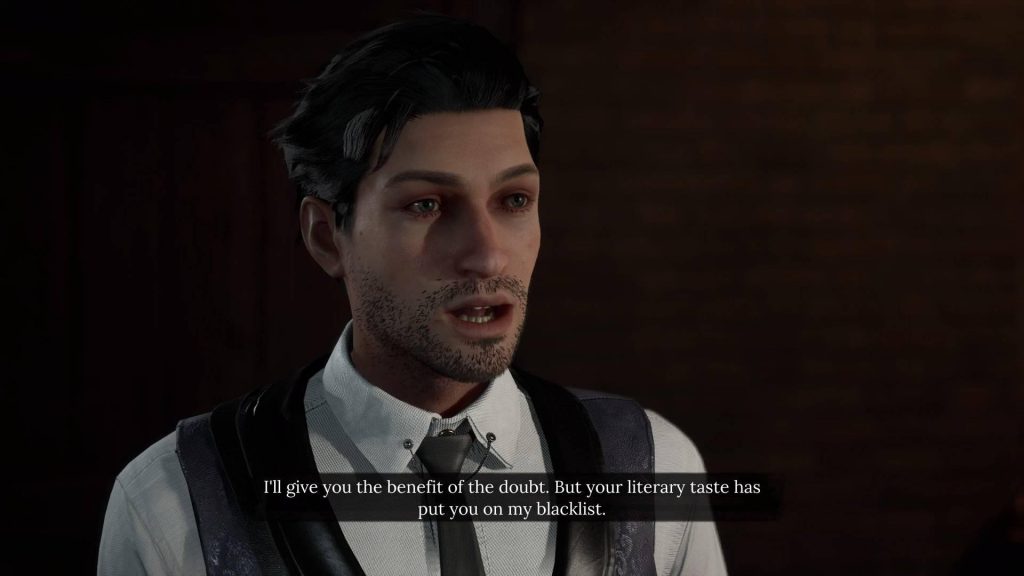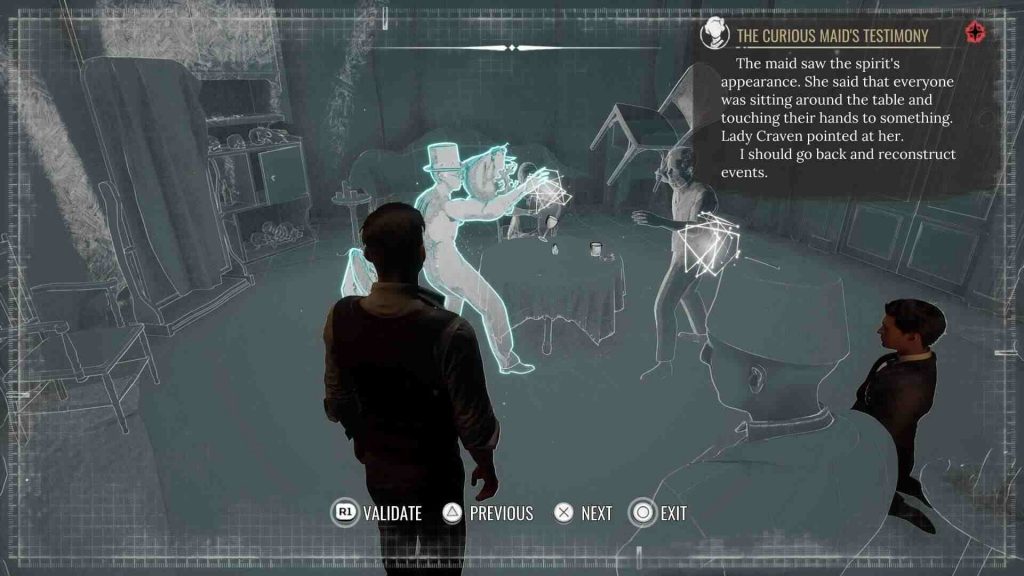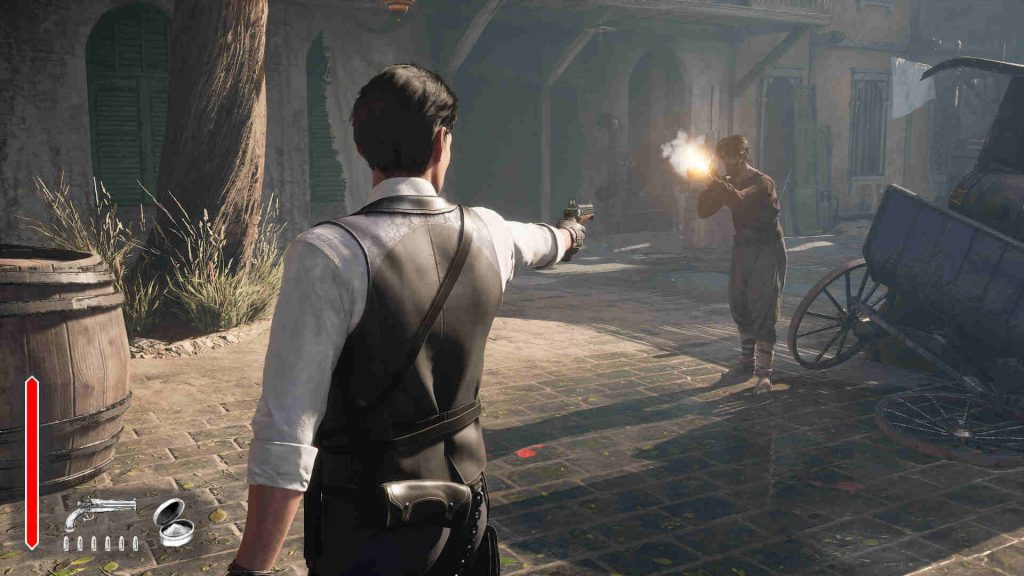Sherlock Holmes Chapter One Review – Elementary, my dear Jon
Sherlock Holmes Chapter One Review
Sherlock Holmes Chapter One ranks high on my list of most anticipated titles for this month, but I still approached it with some optimistic caution and kept my expectations low. The game is coming from Frogwares, the same devs that brought out The Sinking City, one of my guiltiest pleasures of recent years. It had a fantastic detective interface (next to Disco Elysium) but also has the jankiest of combat interfaces.
Sherlock Holmes Chapter One biggest draw is its intricate detective work with the colonial world’s greatest detective. I was sold on the fact that I can solve several cases around the given city-state, Cordona. And given that the current style of any detective game is to solve that one big mystery while surrounded by side and supplementary cases, I couldn’t wait to dig in.
Sherlock Holmes Chapter One follows the story of a young Sherlock Holmes and his imaginary friend Jon as they return to their childhood home in Cordona, a British colony, against Mycroft Holmes’ wishes. Once there, they meet the eccentric artist Vermer Vogel, who informs Sherlock that his mother, Violet Holmes died of other circumstances instead of tuberculosis. Sherlock and Jon proceed to solve this mystery and along its wake, several murders that have coincidentally occurred upon Sherlock’s arrival.
The Commonwealth’s Greatest Detective
I really enjoyed this re-envisioning of Sherlock Holmes from the point of view of a privileged, condescending, and unhinged young man at the top of his social class in the midst of Victorian-era British Rule. Sherlock Holmes Chapter One reminds me of the Batman Year One comic series (popularized by The Long Halloween), where they portray a raw but immensely talented youth unaware of how much responsibility they wield with their power and the consequences brought on by this privilege.
While his deduction skills are definitely top-notch, I really appreciated how the supporting cast sees through his condescension and puts him in his place numerous times. It’s quite entertaining seeing where his naivete and hubris get him. While some circumstances feel unbelievable, I could accept that Sherlock mostly gets away with what he gets away with because of his influence and social class. These subtle nuances really bring out the lore in Sherlock Holmes Chapter One.

The biggest mechanic I enjoy about Sherlock Holmes Chapter One‘s detective interface is its “no guide” approach, going against the way many open-world games are built these days. Most open-world games tell you exactly where to go, which removes the exploration novelty of it all. In this title, you would have to determine where to go next with your clues and you would have to manually mark it on your map. Not only do you have to determine what to do next, but you’ll also need to figure out how to dress for the part and determine how to acquire clues for the next step.
Cordona is also a highly classist society, a melting pot of different ethnicities and cultures, with Sherlock Holmes at the top of its proverbial food chain. I love how he really doesn’t have it completely easy, whereas many of its populace would avoid him or even be unaccommodating to his colonial whims. While speaking to the police force or with people of his social class can prove to be straightforward, he would have to “dress down” and actually search for the appropriate individuals to talk to in order to receive assistance.
I enjoyed these subtle nuances but also how effectively they’ve implemented the detective mechanics with the social mechanic of Sherlock Holmes Chapter One. Disguises could be bought or interestingly enough “rented” from shopkeepers in order to blend in or infiltrate several areas. If you aren’t able to secure information from bystanders, you can eavesdrop on gossip. When you’ve impressed enough people with your deductive abilities (or just basically namedrop your brother), you can gain access to key individuals who you can question and observe.
Cordona is a massive place divided into five districts of distinct social classes. While it’s easier to get by downtown and near your manor, it’s more difficult to gain information in working-class areas such as Silverton and Miner’s District. Old Town, with a blend of African and Middle Eastern demographics, make for a more hostile environment where you’re largely ignored. To explore more in Sherlock Holmes Chapter One, you would have to delve into the side quests to catch more of the goings-on in the areas away from your point of influence.
A Beautiful Mind
Sherlock Holmes Chapter One builds on The Sinking City and previous Sherlock Holmes titles developed by Frogwares. With that being said, this is probably one of the best detective simulators I’ve played, implementing mechanics seen in its previous titles including the awesome Mind Palace interface.

Sherlock Holmes Chapter One lets you access much of this in the “Concentration” screen, akin to Batman Arkham’s Detective Mode, but improves on it because you won’t have to spend 90% of your time looking at the game like an x-ray, as you have a “Sense” mode that scans the area for clues that you may have missed. Depending on the difficulty selected, there will be hints on where to use your Concentration on in order to finely comb the area for more intricate analysis.
One of the best modes that open up during this concentration process is where you can recreate a crime scene through intense concentration. It is visualized by having your imaginary friend Jon walk through the crime scene re-envisioning what took place. While you can brainstorm as much as you want, what’s annoying is Jon will be judging your prowess through his diary. It’s best not to read it because he gets quite savage with his remarks.
Once you have collected enough data through information gathering, deductions, and also through chemical analysis using your chemistry set, you can have enough clues to gather around your Mind Palace. You can then piece together conclusions regarding that case, and just like in The Sinking City, many of your conclusions show a deep compromise on what transpires. Results aren’t cut and dry, there is a lot of grey. You might find yourself playing a morality tug of war to choose the best outcome.
While the Mind Palace is a great component, unfortunately, it is only present during the main questline. Sadly, Sherlock Holmes Chapter One is quite brief, clocking between 6-8 hours of play time. The side quests do implement some of your concentration abilities, however it doesn’t go in-depth like in the main quests where the full breadth of the Mind Palace is there to be utilized. I wish there could be more DLCs in the future where I can utilize this aspect.
Colonial Batman
Sherlock Holmes Chapter One features a combat system that, for the most part, does what it could. It feels more like puzzle combat rather than an actual fight, and actually reminds me of the Robert Downey Jr/Guy Richie Sherlock Holmes films where he would implement his powers of deduction during his fights. The game tries to combine elements in the Batman Arkham combat style like takedowns and free flow fights, only with a gun.
What I appreciated with this combat style in Sherlock Holmes Chapter One are the puzzle elements that you have to follow in order to systematically take down opponents. You would have to shoot down their armor in order to expose their weak points, use your environment to your advantage, and finally arrest enemies instead of killing them. This provides a neat little mechanic that deters you from killing, maintaining that non-killing code that these heroes embody.

Compared to The Sinking City, Sherlock Holmes Chapter One features a massive improvement in its combat, caging it in convenient areas that don’t take away from the detective components. It also doesn’t gate your progress as you don’t have to learn combat skills or be limited by ammo. If you die, you can always restart without consequence.
However, what’s annoying is its difficult learning curve, especially if you’re aiming to play by Sherlock’s rules and attempt to arrest opponents rather than straight-up killing them. It’s a little awkward because of how the control mapping makes it difficult to turn corners and you eventually get pinned by enemies who will easily murder you when you’re caught in a terrible crossfire.
The good news is that you don’t have many of these encounters during Sherlock Holmes Chapter One‘s story mode, where many of them could be found during side quests, or in the optional Bandit Lairs where you can test your mettle against harder enemies. If you get a perfect arrest streak, you can unlock difficulty multipliers allowing you to earn more money to purchase better disguises and complete your manor’s furniture.
When you’re done with the main quest of Sherlock Holmes Chapter One, the world is free for you to explore, opening up many side quests and other points of interest. I’m glad that there are not many mechanics gating progress, so much so that I actually appreciated a lack of a skill tree and an equipment screen. The disguises serve as cosmetic rewards but also aid you in your information gathering.
What We Liked:
- Visually stunning open world detective simulator.
- Improving on the game mechanics from The Sinking City to provide the best interface for a detective simulator to date.
- Interesting direction for an origin story of Sherlock Holmes.
What We Didn’t Like:
- Combat, while an improvement from The Sinking City, has a steep and awkward learning curve and takes a little longer to get used to.
- Open world mechanics isn’t utilized to its fullest.
- Main questline is brief and side quests don’t use the title’s best mechanics such as the Mind Palace.
Verdict: Buy It!

Sherlock Holmes Chapter One is an enjoyable detective simulator despite its brief runtime. I welcomed the re-envisioning of the game, offering a new perspective on how Sherlock Holmes operated in Victoria Era Britain. The superior detective mechanics, as well as improved combat, make it an accessible experience and while the open world is ripe for improvement, what’s presented is quite serviceable and allows for a decent amount of exploration.
I commend Frogwares for its mastery of this genre. Sherlock Holmes Chapter One is being self-published by the company and I fully support their independent push for this title. I’m really impressed with what they’ve created and I really hope for an improved The Sinking City remake/sequel in the future with the mechanics seen here, and even another Sherlock Holmes sequel that follows in this direction.
*Sherlock Holmes Chapter One was reviewed on a PlayStation 5 with a review code provided by the publisher.



